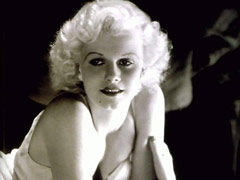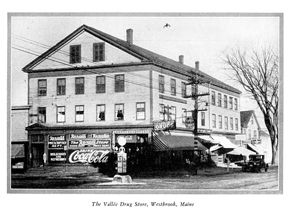Here are 10 things you should know about Elizabeth Patterson, born 146 years ago today. She specialized in persnickety characters—maiden aunts, small town gossips and the like.
Tag: Hotel Roosevelt
Harlow at 100
 We’re not a bit happy about it, but we’re not likely to make it to Los Angeles in time to take in the Harlow at 100 exhibition at the Hollywood Museum, but that’s no reason you shouldn’t endeavor to experience it.
We’re not a bit happy about it, but we’re not likely to make it to Los Angeles in time to take in the Harlow at 100 exhibition at the Hollywood Museum, but that’s no reason you shouldn’t endeavor to experience it.
It’s hard to imagine, given the success Jean Harlow experienced and the level of influence she still has, that she lived to be only 26. How many of Hollywood’s most beloved stars would still be remembered today if their careers had come to a tragic end at age 26? Very few, we’re convinced (though one could argue that the legacies of certain actors, e.g. James Dean and Marilyn Monroe, have actually been bolstered by their premature deaths).
Jean was born Harlean Harlow Carpenter, the daughter of a Kansas City dentist and his wife.
Her mother, born Jean Poe Harlow, resented her arranaged marriage to Harlow’s father and requested a divorce, which was granted in 1922. Months later, Jean and Harlean moved to Los Angeles, as Jean (the mother—confusing, no?) had designs on an actingc career, and like many a frustrated parent, she passed (forced) her dreams on to her daughter.
Mother and daughter returned to the Midwest within a couple of years. Harlean was eventually enrolled in the Ferry Hall School (now known as Lake Forest Academy) in Lake Forest, Illinois, where she eventually met Charles “Chuck” McGrew, heir to a family fortune and six years her elder.
The two were married in 1927 and moved to Beverly Hills, as Chuck sought to put some distance between Harlean and the overbearing mother Jean. But it was to no avail. The story goes that when young Harlean drove a pal to the Fox Studios for an audition, she herself was encouraged to audition. After spurning overtures from Central Casting, Harlean’s pal and Mother Jean, who had since moved to L.A., goaded her into registering with Central Casting. She did, under her mother’s maiden name, Jean Harlow, and the rest, as they say, is history.
The exhibition, described by the museum as the world’s largest collection of memorabilia saluting the original “Platinum Blonde” and “Blonde Bombshell,” includes artifacts from seven private collections and includes “private letters, studio contracts, photos, posters, autographs, her childhood family Bible, favorite white fox fur cape and even her luxury car—a 1932 Packard Phaeton.”
May we pause here to reiterate how much it pains us that we’ll likely not find ourselves in Southern California in time to take in this exhbition?
The Hollywood Museum sits right in heart of Tinseltown, at Hollywood and Highland, in the historic Max Factor Building, within walking distance of Hollywood’s oldest restaurant, Musso and Frank Grill; Hollywood’s first pizzeria, Miceli’s; the legendary and still fabulous Grauman’s Chinese Theatre; the Hotel Roosevelt, site of the first presentation of the Academy Awards; and so many other movieland attractions.
The exhibition is scheduled to run thorugh Sept. 5, 2011. If you’re within striking distance of Hollywood and have an affection for Hollywood pictures of the 1930s, you’d be a darned fool to miss it.
Fridays with Rudy: Vagabond Dreams Come True, Ch. 12
In Chapter 12 of his 1930 memoir, Vagabond Dreams Come True, Rudy Vallée finally gets around to providing some typical memoir material, sharing tales of his boyhood in Westbrook, Maine, and offering accounts of his experiences traveling west to Hollywood to make his first picture, The Vagabond Lover (1929).
From Westbrook to Hollywood
 However, it was during my boyhood in Westbrook, Maine, that I first began to dream of the theatre. I must have inherited a love for all things theatrical from my father who, though a druggist all his life, had been associated with several theatres in various small business ways. Anyway it was always in the back of my head, and even when I was in the early grades of grammar school I used to climb up by the door of the motion picture booth and peek in to watch the film with fascinated eyes as it went past the aperture plate, with the bright light from the arc lamp shining on it; and the hum of the machine as the operator cranked it by hand, and the smell of film and film cement meant as much to me as the picture itself.
However, it was during my boyhood in Westbrook, Maine, that I first began to dream of the theatre. I must have inherited a love for all things theatrical from my father who, though a druggist all his life, had been associated with several theatres in various small business ways. Anyway it was always in the back of my head, and even when I was in the early grades of grammar school I used to climb up by the door of the motion picture booth and peek in to watch the film with fascinated eyes as it went past the aperture plate, with the bright light from the arc lamp shining on it; and the hum of the machine as the operator cranked it by hand, and the smell of film and film cement meant as much to me as the picture itself.